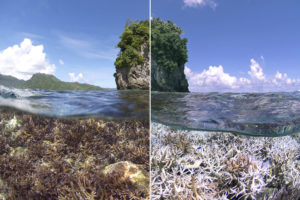Feature: As climate extremes hit land don’t forget those in the ocean
Dr Carol Turley, Dr Phil Williamson and Professor Ric Williams explain why we must pay attention to the climate extremes in the ocean.
The damage to society is clearly greatest when weather extremes occur on land, such as the ferocious heat and deadly floods that recently shattered records across the northern hemisphere.
The evidence linking these extremes to changes in the atmosphere, primarily due to burning fossil fuels, is now overwhelming.
Yet the ocean is also undergoing profound change, with equally crucial consequences for the planet. Both long-term warming and local heatwaves disrupt marine systems, with many impacts that make matters worse for marine life. And for us.
The ocean is both Earth’s central heating system and air conditioner, with its large-scale circulation patterns determining future climate on both regional and global scales.
The ocean is also where more than 90% of recent global warming has occurred, increasing its heat content as thermal energy. Whilst ocean warming – and its rate of increase – is greatest in near-surface waters, where marine life is most abundant, all water depths are affected.

Coral Bleaching in American Samoa, Before (Dec 2014) & After (Feb 2015)
Over the past 50 years, the global frequency of marine heatwaves has doubled.
They have also become longer-lasting, more intense and extensive. The extraordinary heat that hit North America over the past few weeks killed hundreds of millions of marine animals along the Pacific Coast. Marine heatwaves have also had a devastating effect on coral reefs, which harbour amazing biodiversity, and on coastal vegetation, such as mangroves and seagrass meadows, releasing their carbon stores that have accumulated over many centuries.
As well as soaking up the heat, the ocean has taken up around a quarter of the current man-made carbon dioxide emissions.
Together these removal processes have greatly mitigated the rate of climate change on land. Yet these benefits have come at a price: not only causing ocean warming but also ocean acidification from CO2 increase; loss of oxygen; and a near-doubling of the rate of sea-level rise, through volume expansion.
The direct effect of such changes is severe degradation of the functioning and productivity of marine ecosystems; their indirect effects, through further climate feedbacks, threaten the future ability of the ocean to support every other habitat on Earth.
All marine environments and organisms – from coast to abyssal depth and from the equator to the poles – are now already impacted, to some degree, by one or more of these human-driven climate change stressors. Such pressures will intensify in future, adding to and interacting with many other non-climatic stressors.
Food-web interactions accentuate such impacts. In particular, climate change effects on the growth and abundance of microscopic marine plants known as phytoplankton have knock-on outcomes, either positive or negative, on nearly everything else, from zooplankton to fish, also seafloor organisms, marine mammals and seabirds.
The overall effect is a reduction in all the benefits marine ecosystems provide to human society, including food provision and the ocean’s core role in climate regulation.
The adverse impacts of marine stressors are strongest in coastal waters, where higher temperature increases interact with other factors. For example, associated oxygen depletion is worsened at the coastal seafloor due to land-derived fertilizer inputs causing productivity changes. These effects increase the vulnerability of fish and shellfish to over-fishing and population collapse.
The combined effects of future warming and sea-level rise make it highly risky to offset carbon emissions through the restoration of coastal ‘blue carbon’ ecosystems, however desirable that action might be for other reasons.
Even if we are successful in limiting global temperature increase to around 2°C, we can’t be confident that those habitats will survive such conditions, potentially losing their carbon stores when we need them the most.
Many actions have been taken to protect the marine environment and the crucial services it provides and to raise the profile of ocean issues in climate policy discussions.
Yet land-based considerations will inevitably dominate the COP26 climate negotiations in Glasgow in just three months’ time, since for any single nation the ocean will, at best, be a secondary consideration.
Giving greater importance to the ocean, considering impacts as well as possible solutions, will strengthen collective ambition to achieve net-zero carbon.
We all now know that serious political action is needed; what is not so well known is that direct and indirect ocean protection is needed to avoid continued climate breakdown and its unfolding consequences.
To learn more about why the ocean matters in climate negotiations, visit: https://www.gla.ac.uk/media/Media_795093_smxx.pdf
Photo Credit – The Ocean Agency / Ocean Image Bank















